How a choir brought Welsh workers together in Oxford
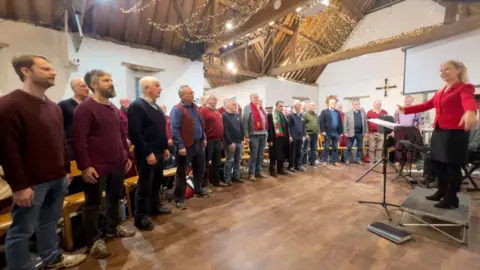 BBC
BBCWhen Prof JC Niala started collecting stories for a new project, she did not expect to hear about how Welsh people once walked all the way to Oxford.
The writer and historian has curated Journeys to Oxford at the Museum of Oxford.
During her work, she was introduced to the story of people from Wales coming to Morris Motors in Cowley during The Great Depression when unemployment struck the coal mining industry.
It lead her to the Oxford Welsh Male Voice Choir which "is carrying that cultural heritage from the south of Wales through their voice".
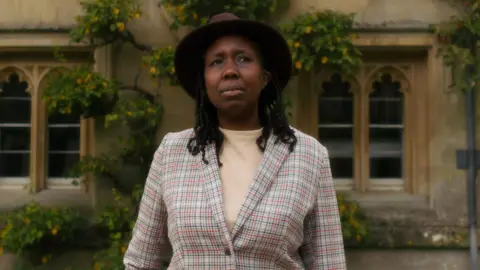 Sarah Halliday
Sarah Halliday"I started where I always start - in Coco Noir cafe in Headington," Prof Niala said during her guest editor appearance on BBC Radio Oxford's Breakfast Show with Sophie Law.
"A lovely elderly woman said to me 'do you know about the Welsh people who walked to Oxford?'
"Initially, I thought I must have misheard [but] she said 'my family come from that background'."
The significant increase in unemployment in Britain was one of the main effects of the Depression, leaving about 25% of the workforce out of a job in 1933.
Prof Niala, who has a PhD in social anthropology, was told about the poverty and hunger that people from South Wales had endured while the coal industry had experienced serious labour shortage.
Areas of heavy industry, which had not modernised after WWI, were worst hit, including coal mining.
It is estimated that about 430,000 people left Wales during the 1920s and 1930s in search for work and a better life in more prosperous areas, such as south east England.
"There were various marches that took place, some of them are called the hunger marches," Prof Niala said.
"But there were also large groups of people who walked all the way to Oxford from South Wales to find work and ...were able to find work at the Mini Plant."
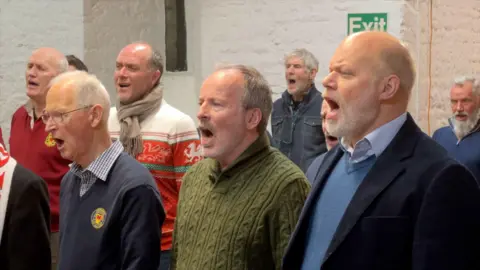
Prof Niala said some of the workers cycled home at weekends due to the lack of means.
"I think it's also important to remember that not all of them had the easiest of landings," she said.
"There were people in Oxford who felt that Welsh labour arriving was undercutting English labour.
"They would turn up hoping to get room and board and being turned away because they were Welsh, some had to live in tents."
She then discovered the Oxford Welsh Male Voice Choir, meeting some of the current members.
"It was something that they were able to carry here with them because your voice is something that you take wherever you go," she said.
"They look stunning, sound amazing and carry that cultural heritage from the south of Wales through their voice."
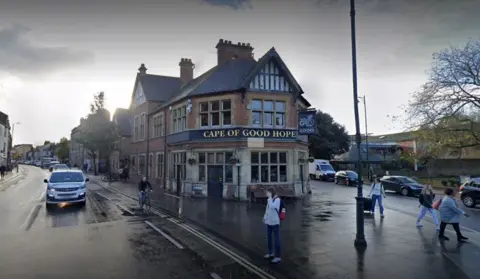 Google
GoogleSharron Jenkinson, who is now the choir's archivist, became involved with it through her husband.
"The choir was formed in 1928 - that's around the time when the first people were migrating to Oxford and it started off as an octet," she said.
"This was a group of lonely young men who'd left their families behind and who needed something to do.
"They met in the Cape of Good Hope pub ... and then gradually, as more Welsh people came to Oxford, the octet became a choir."
Mrs Jenkinson added: "They sang on their way to the mines, on their way back at weekends, in church.
"They developed a particular style of singing in the Welsh valleys, which was very much about learning pieces by rote."
She said the Welsh community could be "justifiably proud" of the impact it had had on the city.
"Many of the original members of the choir still have grandchildren and great grandchildren living locally.
"The choir has always had that very strong link with Cowley and with the car industry in particular."
She said that today, the choir had "a wonderfully eclectic" mix of people.
"University professors, doctors, people who've come from an industrial background - all life is there."
Choir singers described it as "a lovely thing to be in".
"Some of the Welsh songs are wonderfully romantic and wonderfully tragic...and they're really excellent to sing," Dominic Fawcett said.
Another member, Dan Preece, said: "Singing is food for the soul and it's something I enjoy doing every week to relax."
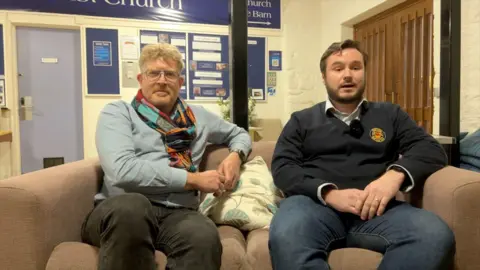
Prof Niala said she saw those stories as "still quite contemporary in a way".
She made a comparison with "people from elsewhere, arriving in the city of Oxford, making their home".
"They fought for their rights which some people in Oxford didn't appreciate but others also benefited from.
"There's something about that Welsh spirit of ... wanting work, [being] willing to work, trying to make their lives better, but they also spoke to dignity and that says something."
You can follow BBC Oxfordshire on Facebook, X, or Instagram.
